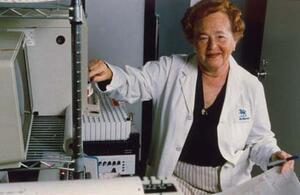Gertrude Elion wins Nobel Prize
The October 17, 1988 announcement that chemist Gertrude Elion had won the Nobel Prize in Physiology or Medicine represented the culmination of an unlikely career. The young Elion had known what she wanted to do—but nobody seemed ready to let her do it. New York’s Hunter College provided her with a free education during the Depression, but when she graduated at age 19, summa cum laude and Phi Beta Kappa, not one graduate school would provide her with needed financial aid.
Unable to find a laboratory job, she started secretarial school. Supporting herself as a doctor’s receptionist and a substitute high school science teacher, Elion earned a master’s degree in chemistry from New York University in 1941 (she was the only woman in her classes). With more lab opportunities open to women during World War II, Elion found a job at Burroughs Wellcome, a pharmaceutical company, in 1944.
Elion’s research with her mentor and partner George Hitchings led to the first effective treatment for childhood leukemia and to immunosuppressants that made organ transplants possible. Her anti-viral research led to treatments for many ailments including AIDS. Elion, whose doctorates were all honorary, received the 1988 Nobel Prize in Physiology or Medicine, together with Hitchings and British scientist James Black.
Elion thus joined an impressive list of American Jewish female Nobel Prize winners in science that also includes American-born Rosalyn Yalow (1977) and Gerty Theresa Radnitz Cori (1947), as well as Rita Levi-Montalcini (1986), and Ada Yonath (2009), who were born and educated abroad.




Brilliant and life saving work.